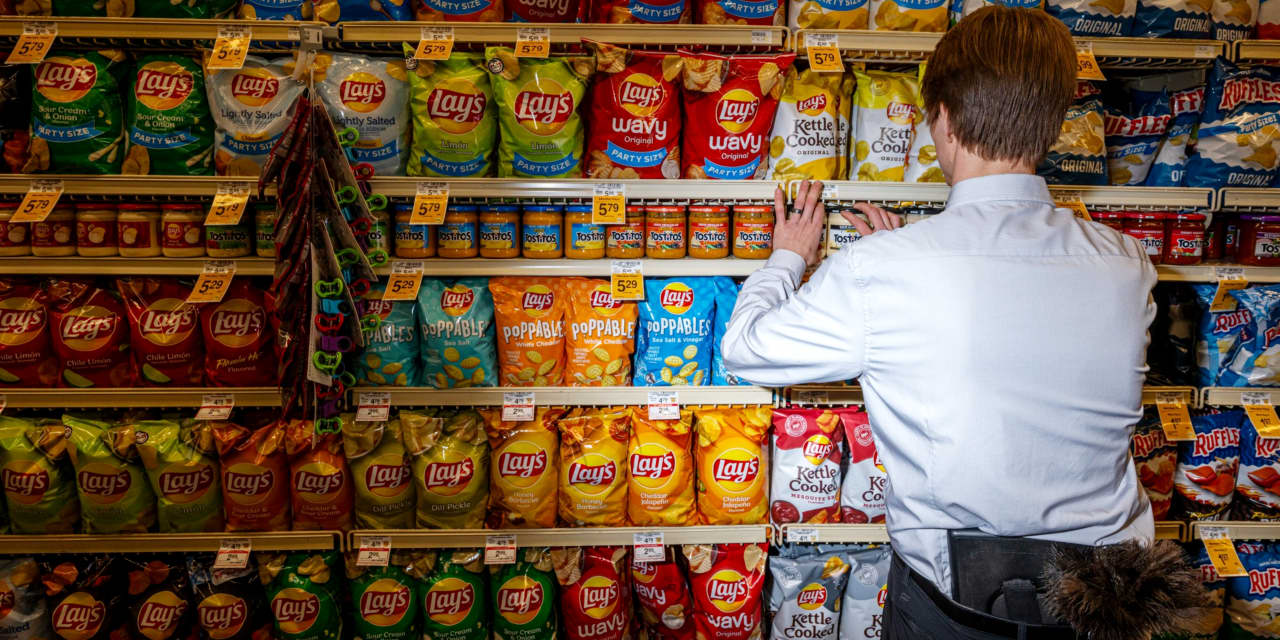Last week, French grocery chain
Carrefour
said it would stop selling a range of
PepsiCo
products due to “unacceptable price increases.” The snack giant pushed back, telling The Wall Street Journal it was the one that stopped supplying the supermarket.
The public showdown is a testament of Europe’s food inflation that remains high even as price gains in the U.S. have slowed down. But companies like
PepsiCo
are raising prices for one simple reason: Consumers aren’t cutting back their purchases that much, yet.
PepsiCo’s earnings numbers are telling: It’s making plenty of money in Europe despite complaints from consumers, politicians, and grocers about high prices.
In the latest fiscal quarter ended on Sept. 9, the price mix of Pepsico’s products was 13% higher than a year ago in the European market, but sales volume remained the same, according to company filings. That means a 13% growth in organic net sales with no offset.
With well-managed costs, the food giant grew its profit even more. Excluding the impact from foreign exchange rates, Pepsico’s operating profit in Europe has increased 34% in the latest quarter from a year ago, and margins expanded 82 basis points, according to filings.
The trend is similar in other regions. Across all geographies, PepsiCo products’ prices were 11% higher from a year ago in the latest quarter, while volume declined just 2.5%. That translated to a 8.8% growth in organic revenue, while its organic operating profit increased by 12%.
Like PepsiCo, many food companies raised prices throughout rising inflation with limited damage to sales volume. Some have seen their profit margins shrink in 2022 amid high energy costs, but most were able to maintain or even expand margins in the past few years.
Notably, consumers haven’t been put off by price hikes in their favorite snacks.
Mondelez International,
the maker of Oreo and Ritz, raised prices by 12% in the latest quarter from a year ago. But sales volume didn’t drop. Instead, consumers are buying 3.8% more.
Chocolate maker
Hershey
has seen similar strength, with sales volume up 1% despite a nearly 10% price hike.
People are less tolerant with expensive food staples, though.
Conagra Brands,
known for its canned and packaged meals, recently reported a 3% drop in sales volume although its price mix slid a little from a year ago. Likewise, sales volume in
Campbell Soup
and
General Mills
products dropped 5% and 4%, respectively, from a year ago, even as prices are just 3% higher.
Make no mistake. These companies have been raising prices a lot over the past year. But consumers have been opting for more of their cheaper items, dragging down the price mix and sales value overall.
Among a group of 10 food companies Barron’s reviewed,
Coca-Cola
has the largest operating margin between 25% and 30%, followed by Hershey and
Keurig Dr Pepper.
Campbell Soup,
Conagra, and Mondelez are on the lower end between 10% to 15%.
It’s yet to be seen whether Carrefour’s boycott could help it cut a better deal with PepsiCo. Affected Carrefour stores represent only 0.25% of PepsiCo’s global revenue, according to the WSJ report, so the move will likely have little impact on the food giant.
Still, the spat sets an example of how retailers—pressured by increasingly price-conscious consumers and concerned politicians—could make a more aggressive stance in their demand for lower prices.
Even if an agreement was reached, it would be hard to know whether prices actually went down since the negotiations usually take place behind the doors. Both PepsiCo and Carrefour didn’t respond to Barron’s request for comment.
In 2022,
Kraft Heinz
stopped supplying its baked beans, soups, and ketchup, among others, to the U.K.’s largest supermarket
Tesco
in a dispute over pricing. The two parties soon reached an agreement to put the products back on shelf, but didn’t disclose how prices were set.
Instead of boycotts from retailers, consumers’ actions would matter more to food companies when setting prices. Pepsi and Doritos aren’t something essential to life. If shoppers start buying less, PepsiCo will likely drop prices and cut its margins.
Many food companies are expected to report holiday season earnings in early February. Investors should closely watch for signs of softening demand. That will be the real price damper.
Write to Evie Liu at evie.liu@barrons.com
Read the full article here


